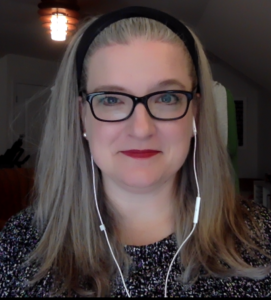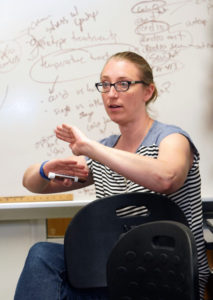
Center for Teaching Director and Associate Professor of Education Victoria Russell
Victoria Russell comes from a family of teachers, but it was a career path she initially resisted. Instead, she set her sights on becoming a colonial historian. That changed when she took a break from archiving one day to volunteer at a local elementary school.
“I fell in love with being in the classroom,” said Russell, who soon began a master’s degree in education, while also completing her graduate work in history.
After two decades teaching students – including aspiring special education teachers in UMW’s College of Education since 2014 – she’s now supporting professors who wish to become better educators.
“At all touchpoints throughout my career, I’ve thrived when working directly with other teachers,” said Russell, who became the director of Mary Washington’s Center for Teaching (CfT) in June, three months into the pandemic.
Her work was cut out for her. Most UMW professors had never taught an online course before COVID-19 hit, so Russell and her team collaborated with Digital Learning Support (DLS) to create ReFocus Online, a four-week virtual teaching design camp for faculty and staff. Over 200 instructors signed up for at least one event or workshop this summer, and UMW resources were also shared with faculty and teaching centers at colleges and universities across Virginia and the country.
“We wanted to provide rich learning experiences for students this year,” Russell said, “no matter how and where we had to do it.”
Many of her colleagues were concerned about teaching virtually, but Russell says “their effort and willingness to learn new things” makes her confident they’ll succeed this year, whether in a classroom or online. “They learned about new ideas and ended up creating fabulous courses.”
Q: What’s happening with ReFocus Online this fall?
A: We’ve refocused! The website remains available as a resource, but we’re providing more direct and daily support for faculty. It’s about maintaining energy and momentum as well as problem-solving when challenges occur.
Q: What’s the Faculty Pedagogy Colloquium?
A: It’s a chance for faculty to share research about teaching or strategies they’re using in their classrooms. We’re also co-sponsoring several panels, including a Teaching Talk series on race in the classroom. A second panel, co-sponsored with the Women’s and Gender Studies program, focuses on post-tenure mentoring and faculty development.
Q: What’s the most rewarding part of your job?
A: When faculty members share ideas they’d like to do but assume aren’t possible. The joy in a colleague’s voice after we help find a solution is the best feeling.
Q: The most challenging?
A: Being such a small unit and wanting to do more.
Q: While you’ve been teleworking, what have you missed about the UMW campus?
A: Seeing former and current students on Campus Walk. Getting coffee and lunch with friends. The laughter and energy in the CfT/DLS suite. And the leaves changing colors – fall is my favorite season at UMW.
Q: What’s your motto?
A: “And above all, watch with glittering eyes the whole world around you because the greatest secrets are always in the most unlikely places.” – Roald Dahl. It reminds me to pay attention and appreciate small bits of beauty and joy.
